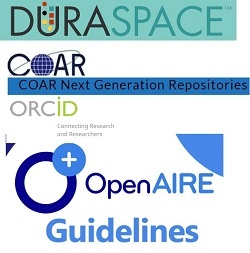DSpace 7 Data Model on support of new Digital Object types aligned with the COAR Next Generation Repositories recommendations and OpenAIRE v4 guidelines
20/06/2018


The DSpace Steering Group strongly recommends that the DSpace 7 data model should be expanded to support new object types (entities) to provide the following immediate benefits:
|
In order to achieve this, the Steering Group recommends adopting a flexible, configurable data model which allows existing DSpace institutions to choose whether to enable new (out-of-the-box) entities in their system.
The solution should initially concentrate on entities required to meet OpenAIRE v4 guidelines, while also allowing institutions to create/design additional entities to meet other use cases.
The solution should be built incrementally (over several releases), so as to not adversely affect the DSpace upgrade process.
|
The end result should be a system that supports configurable entities in its data model, as this will allow for DSpace to be adapted/extended for additional use cases. However, in order to stay true to the goals described in the DSpace 2015-18 Strategic Plan, DSpace should avoid becoming too specific to a single repository use case. Instead, a goal of configurable entities should be to allow third-party extensions or add-ons to extend the DSpace data model for specific use cases. One example may be DSpace-CRIS, a widely adopted DSpace extension to support CRIS use cases. Configurable entities should allow for such extensions to be more easily installed/maintained in out-of-the-box DSpace. |
For the reasons stated above, the Steering Group recommends the new data model be based on the Option #3 proposal (see DSpace Entities Overview / Discussion document), where Entities are proposed as an extension of the Item model. The creation of this new model should be coordinated by DuraSpace / DSpace Steering, and be developed in collaboration with the global DSpace community. By doing so, the configurable entities will be a transparent and inclusively developed model ensuring that DSpace is able to face the new challenges and address the needs and requirements of its global community.
The DSpace Steering Group welcome sthe DSpace community’s involvement and support going forward, and it will be incorporated as opportunities arise.
|
The Fedora, DSpace and VIVO, - DURASPACE community-supported projects provide more than 2500 users worldwide from more than 120 countries with freely-available open source software (DURASPACE Open Source Projects, 2018) |
Source: DURASPACE

Related content:
- The DSpace Community Annual Report 2017 – July 2018
- Participate: ORCID in Repositories Task Force (DURASPACE)
- DSpace 7 Updates from OR2018, Including a Recorded DSpace 7 Demo (DURASPACE)
- EC Expert Group on Turning FAIR Data into Reality (June 2018)
- Research Data Repository Interoperability WG Final Recommendations (Research Data Alliance)
- Use COAR Controlled Vocabularies to enhance the Interoperability across repositories and with other related systems
- All the presentations from COAR 2018 annual meeting
- DSpace-GLAM based on DSpace-CRIS : Manage, Analyze & Preserve your digital heritage
- Beyond Open Access: Five prerequisites for a sustainable knowledge commons (COAR)
- SPAR Ontologies to enhance the scholarly articles with annotations about its structural and semantic characterisations
- Text & Data Mining in PoolParty Semantic Suite (recorded Webinar@AIMS)
- Towards Digital Object Cloud (DOC) compliant with the FAIR principles

To be kept up-to-date with AIMS news, please, Sign up for AIMS news and follow @AIMS_Community on Twitter
